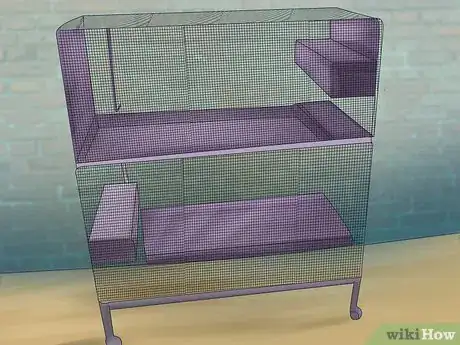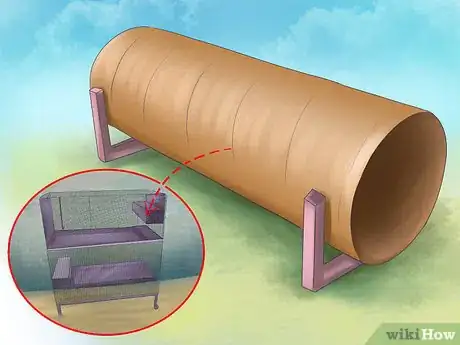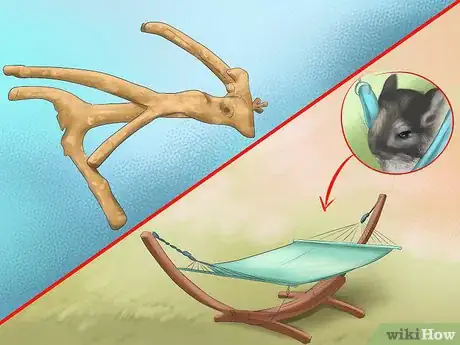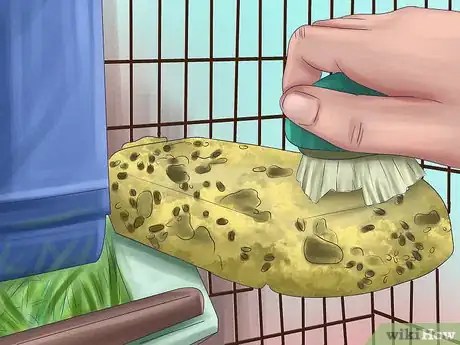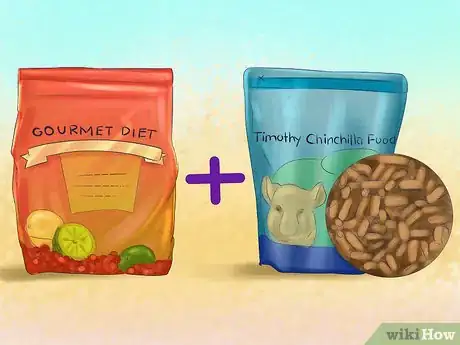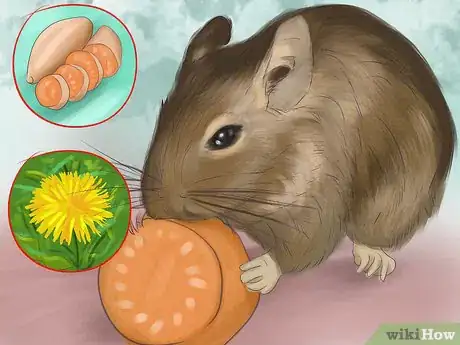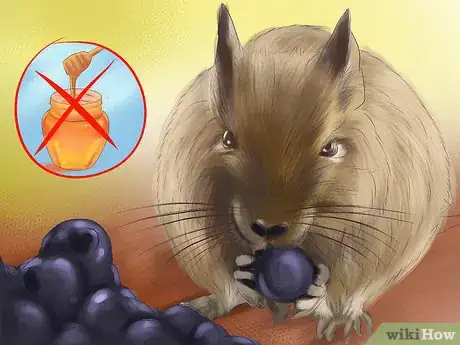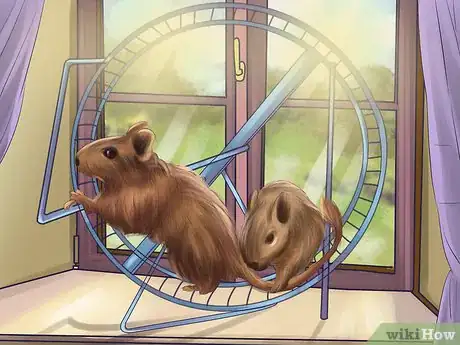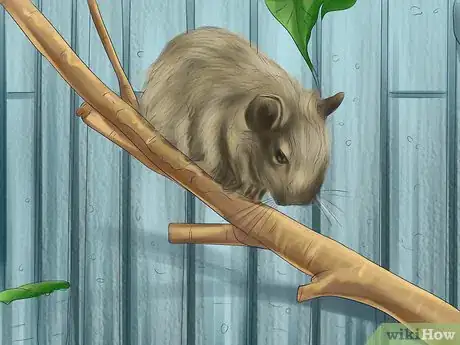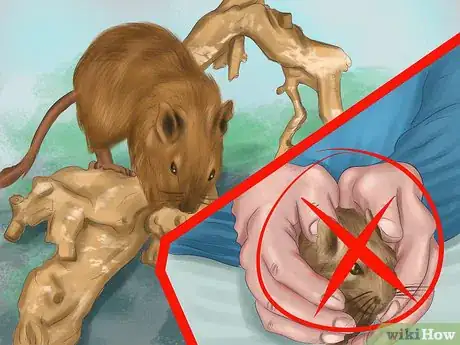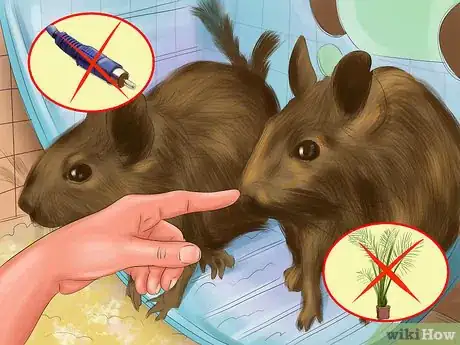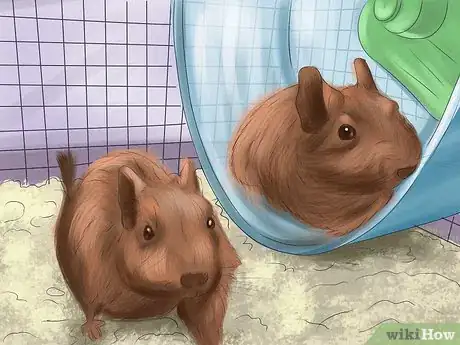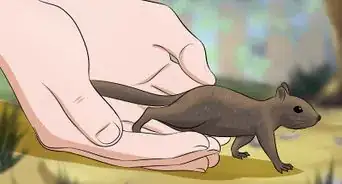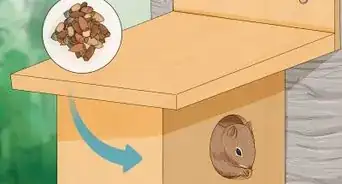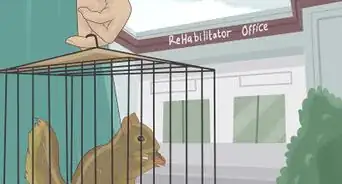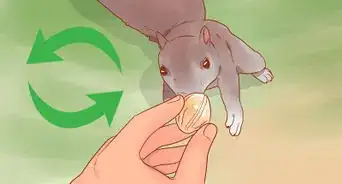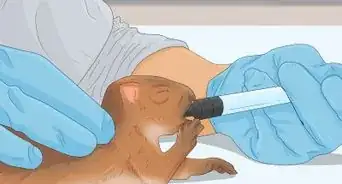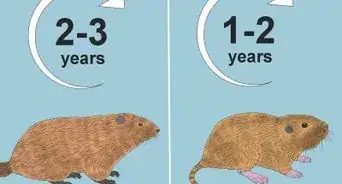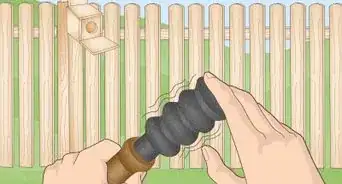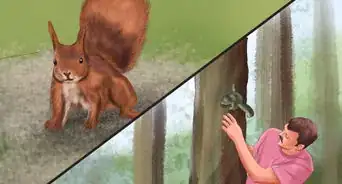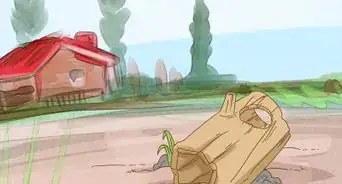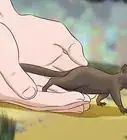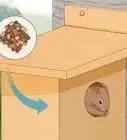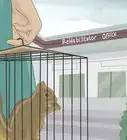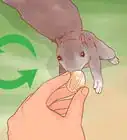This article was co-authored by Pippa Elliott, MRCVS. Dr. Elliott, BVMS, MRCVS is a veterinarian with over 30 years of experience in veterinary surgery and companion animal practice. She graduated from the University of Glasgow in 1987 with a degree in veterinary medicine and surgery. She has worked at the same animal clinic in her hometown for over 20 years.
wikiHow marks an article as reader-approved once it receives enough positive feedback. In this case, 97% of readers who voted found the article helpful, earning it our reader-approved status.
This article has been viewed 70,640 times.
A degu is a small rodent which comes from Chile. They are friendly, curious creatures and can make excellent pets. To keep a degu, make sure they have the right environment. A degu needs a spacious cage with plenty of hiding places and perches. Make sure you feed your degu a healthy diet rich in vitamins and nutrients. You should also entertain your degu. Degus need a lot of socialization to be healthy and happy. It's a bad idea to only keep a single degu as a pet. You should always keep degus in groups.
Steps
Setting Up the Right Environment
-
1Make sure to get a big cage. Degus need a lot of space to be healthy and happy. They are very active animals and will not do well in a smaller cage. Opt for the biggest and largest cage you can fit in your apartment.[1]
- As degus are not a popular pet, you may not be able to find a cage specifically designed for degus. However, you can get a cage for a chinchilla or another rodent.[2]
- You should also make sure the cage doesn't have any plastic parts. Degus will chew through plastic. A metal cage, or a cage made with chew-proof plastic, is best for a degu.
-
2Give your degu hiding areas. Degus are social, but they also need some privacy during the day. You should have a lot of boxes your degus can hide in if they crave privacy.
- You can make a hiding place using a cardboard box or a large cardboard tube. You can simply place a box or tube in the cage for your degu to hide in.
- You can also buy hiding boxes and toy caves at a local pet store. Make sure, however, all the materials used are safe for animals the size of degus.
Advertisement -
3Provide perches and ledges. Degus love to climb, so make sure the cage has perches and ledges to keep your degu active during the day. You can buy bird perches and ledges at a local pet store and install them in your degu's cage. You can also install hammocks, but be careful to supervise your degu when it's using the hammock. Degus will chew through rope-like materials, so remove the hammock from the cage when you're not around.
-
4Clean your degu's cage regularly. In order to stay healthy, degus need their cages clean. Your degu will spend most of its life in its cage, so make sure to clean it regularly to keep the cage free of bacteria.[3]
- You should clean the cage out once a week, removing any droppings, spilled food, or other debris from the bottom of the cage. You should also remove any old bedding and replace it with new bedding.
- You should also wipe down things like toys and food and water bowls. If a food or water bowl is very dirty, remove it and clean it with soap and water before returning it to the cage.
- You should also change the bedding when you clean the cage. A degu's cage should be lined with a layer of bedding from a pet store. You should remove all the bedding once a week and replace it with new, fresh bedding.
Feeding Your Degu
-
1Mix guinea pig and chinchilla pellets. You may not be able to find food specifically made for degus. You can mix guinea pig pellets and chinchilla pellets and feed this to your degu as the primary form of food.[4]
- Degus cannot process sugar or carbohydrates, so make sure you choose pellets that do not contain molasses.
-
2Supplement their diet with vegetables. Degus enjoy sweet potatoes, dandelions, and leafy vegetables. They also eat a lot of hay, so they should have a continuous supply of hay in their cages.[5]
- If you feed your degu potatoes, make sure to remove the skins. Potato skin can be toxic for degus.
- As degus cannot process sugar, fruit and dried fruit are not good treats for a degu.[6]
-
3Ask your vet about vitamin supplements. If you're worried about your degu getting the right vitamins and nutrients, talk to your vet about supplements. As you may not be able to find food specifically made for degus, supplements may be necessary to keep your degu healthy.[7]
- Make sure you find a vet that knows how to treat small animals like degus.
-
4Avoid treats containing sugar. Degus cannot process sugar. If you give your degu sweet treats, stick to fresh fruit. Anything with sugar can be very harmful to a degu, so do not purchase treats containing sugar.[8]
- You should also stay away from treats that are high in fat or contain honey.
Entertaining Your Degu
-
1Allow degus to play outside their enclosure. While degus will be in their cages for most of their lives, they are social and active animals. You need to give your degu time out of its cage on occasion to keep it happy and entertained.
- Degus enjoy fresh air and sunshine, so play with your degu next to a window. Avoid taking a degu directly outside, as degus can escape easily and are hard to catch.
- Give your degu some time out of the cage at least once a day.
-
2Make sure your degu exercises. Your degu needs the chance to exercise during the day, even when its not out of the cage. Make sure your degu has access to an exercise wheel. No degu should be kept in a cage without a wheel. The perches and ledges in a cage will also allow a degu to exercise, as they can jump and climb.[9]
- A metal exercise wheel that's at least 11 to 12 inches across is best for a degu.
-
3Respect your degu's personal space. Degus do like to socialize with their owners. However, degus do not like to be held or cuddled. Allow your degu to come to you, and limit the amount of time you spend holding it.
- If you just got your degu, give it a few days to settle in before you attempt to hold or cuddle it.
-
4Supervise your degu at all times. When your degu is out of the cage, do not let it out of your sight. Degus can escape easily and, due to their size, are not easy to catch. You also want to make sure your degu does not get hurt when playing outside of the cage.
- Keep your degu away from wooden furniture, cables, and plants.
-
5Keep more than one degu. It's a bad idea to keep a single degu. Degus are social animals and do not do well as single pets. You should have at least two degus at a time. However, degus generally do well in larger groups. Consider adopting three to four degus instead of just one.[10]
Warnings
- Be very careful not to give a degu sugar, as it can be very dangerous to a degu's health.⧼thumbs_response⧽
References
- ↑ http://www.pets4homes.co.uk/pet-advice/tips-for-keeping-your-degu-happy-and-healthy.html
- ↑ https://www.animalhub.com/choosing-cage-degu/
- ↑ http://www.pets4homes.co.uk/pet-advice/tips-for-keeping-your-degu-happy-and-healthy.html
- ↑ https://www.bluecross.org.uk/pet-advice/caring-your-degu
- ↑ https://www.bluecross.org.uk/pet-advice/caring-your-degu
- ↑ https://www.animalhumanesociety.org/adoption/degu-care
- ↑ http://www.petsathome.com/shop/en/pets/advice/small-animal-care-advice/degu-care-advice/feeding-your-degu
- ↑ http://www.pets4homes.co.uk/pet-advice/tips-for-keeping-your-degu-happy-and-healthy.html
- ↑ http://www.pets4homes.co.uk/pet-advice/tips-for-keeping-your-degu-happy-and-healthy.html
About This Article
To keep a degu, which is a small rodent from Chile, get the largest cage you can fit in your living space since it will need a lot of room to run around. Degus aren’t a popular pet, so you’ll likely need to look for a chinchilla or rodent cage. Just make sure that the cage is made out of metal since degus will chew through plastic. While setting up the cage, put a lot of boxes, perches, and ledges inside to give your degu places to hide and climb. You’ll also want to put an exercise wheel in the cage to give your degu plenty of exercise. In order to feed your degu, mix guinea pig and chinchilla pellets and supplement its diet with leafy vegetables, sweet potatoes, and hay. For more tips from our Veterinary co-author, including how to play with your degu, keep reading!
